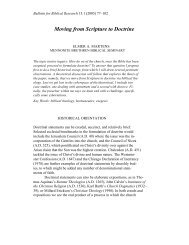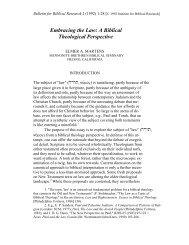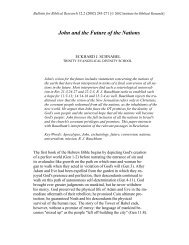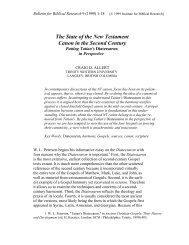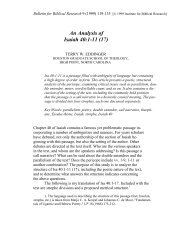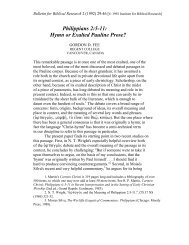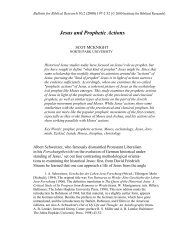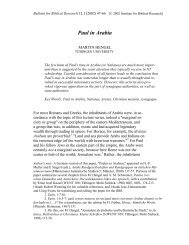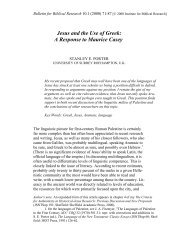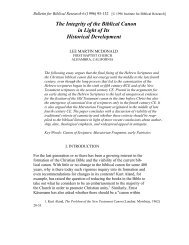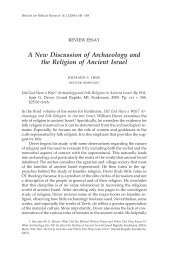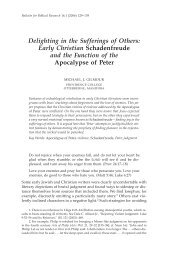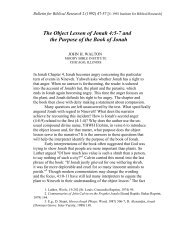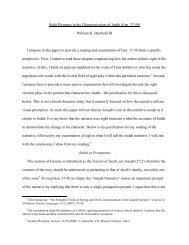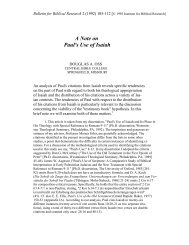Reflections on Exegesis and Spirituality in Philippians 4:10-20
Reflections on Exegesis and Spirituality in Philippians 4:10-20
Reflections on Exegesis and Spirituality in Philippians 4:10-20
You also want an ePaper? Increase the reach of your titles
YUMPU automatically turns print PDFs into web optimized ePapers that Google loves.
FEE: To What End <strong>Exegesis</strong>? 85<br />
From his po<strong>in</strong>t of view they obviously have the better of it! First,<br />
he promises that God's reciprocati<strong>on</strong> will cover “every need” of theirs,<br />
especially their material needs, as the c<strong>on</strong>text dem<strong>and</strong>s, <strong>and</strong> also<br />
every other k<strong>in</strong>d of need, as the language dem<strong>and</strong>s. One cannot<br />
imag<strong>in</strong>e a more fitt<strong>in</strong>g way for this letter to c<strong>on</strong>clude, <strong>in</strong> terms of<br />
Paul's f<strong>in</strong>al word to them pers<strong>on</strong>ally. In the midst of their "poverty"<br />
(2 Cor 8:2), God will richly supply their material needs. In their present<br />
suffer<strong>in</strong>g <strong>in</strong> the face of oppositi<strong>on</strong> (1:27-30), God will richly supply<br />
what is needed (steadfastness, joy, <strong>and</strong> encouragement). In their<br />
"need" to advance <strong>in</strong> the faith with <strong>on</strong>e m<strong>in</strong>dset (1:25, 2:1-4, 4:2-3),<br />
God will richly supply the grace <strong>and</strong> humility necessary. In the place<br />
of both "grumbl<strong>in</strong>g" (2:14) <strong>and</strong> "anxiety" (4:6), God will be present<br />
with them as the "God of peace" (4:7, 9). "My God," Paul says, will act<br />
for me <strong>in</strong> your behalf by "fill<strong>in</strong>g to the full all your needs."<br />
And God will do so, Paul says, "<strong>in</strong> keep<strong>in</strong>g with his riches <strong>in</strong><br />
glory <strong>in</strong> Christ Jesus." The <strong>Philippians</strong>' generosity toward Paul, expressed<br />
lavishly <strong>in</strong> the beg<strong>in</strong>n<strong>in</strong>g of v. 18, is exceeded bey<strong>on</strong>d all<br />
imag<strong>in</strong>ati<strong>on</strong> by the lavish "wealth" of the eternal God, who dwells<br />
"<strong>in</strong> glory" full of "riches" made available to his own "<strong>in</strong> Christ Jesus."<br />
God's "riches" are those <strong>in</strong>herent to his be<strong>in</strong>g God, Creator <strong>and</strong> Lord<br />
of all; noth<strong>in</strong>g lies outside his rightful ownership <strong>and</strong> doma<strong>in</strong>. They<br />
are his "<strong>in</strong> glory" <strong>in</strong> the sense that his "riches" exist <strong>in</strong> the sphere of<br />
God's glory, where God "dwells" <strong>in</strong> <strong>in</strong>f<strong>in</strong>ite splendor <strong>and</strong> majesty, the<br />
"glory" that is his as God al<strong>on</strong>e. It is "<strong>in</strong> keep<strong>in</strong>g with" all of this—<br />
not "out of" his riches, but <strong>in</strong> accordance with this norm, the <strong>in</strong>f<strong>in</strong>ite<br />
"riches" of grace that bel<strong>on</strong>g to God's own glory—that God's full<br />
supply will come their way to meet their every need. The language is<br />
deliberately expansive; after all, Paul is try<strong>in</strong>g to say someth<strong>in</strong>g c<strong>on</strong>crete<br />
about the eternal God <strong>and</strong> God's relati<strong>on</strong>ship to his people. This<br />
is why the f<strong>in</strong>al word is not the heavenly <strong>on</strong>e, "<strong>in</strong> glory," but the comb<strong>in</strong>ed<br />
earthly <strong>and</strong> heavenly <strong>on</strong>e, "<strong>in</strong> Christ Jesus." Because Paul has<br />
beheld the "glory of God <strong>in</strong> the face of Christ Jesus" (2 Cor 4:6), expressed<br />
<strong>in</strong> this letter <strong>in</strong> the majestic Christ narrative <strong>in</strong> 2:6-11, Paul<br />
sees clearly that Christ Jesus is the way God has made his love known<br />
<strong>and</strong> available to his human creatures. This is what the letter has ultimately<br />
been all about. It began "<strong>in</strong> Christ Jesus"; it now c<strong>on</strong>cludes<br />
"<strong>in</strong> Christ Jesus." For Paul, "to live is Christ, <strong>and</strong> to die is ga<strong>in</strong>." Thus<br />
the f<strong>in</strong>al word <strong>in</strong> the body of the letter proper is this <strong>on</strong>e: "every need<br />
of yours <strong>in</strong> keep<strong>in</strong>g with the wealth that is God's <strong>in</strong> glory made available<br />
to you <strong>in</strong> Christ Jesus."<br />
This says it all; noth<strong>in</strong>g more can be added, so Paul simply bursts<br />
<strong>in</strong>to doxology. The <strong>in</strong>dicative yields to the imperative of worship.<br />
When <strong>on</strong>e th<strong>in</strong>ks <strong>on</strong> the "riches of God" lavished <strong>on</strong> us <strong>in</strong> Christ



